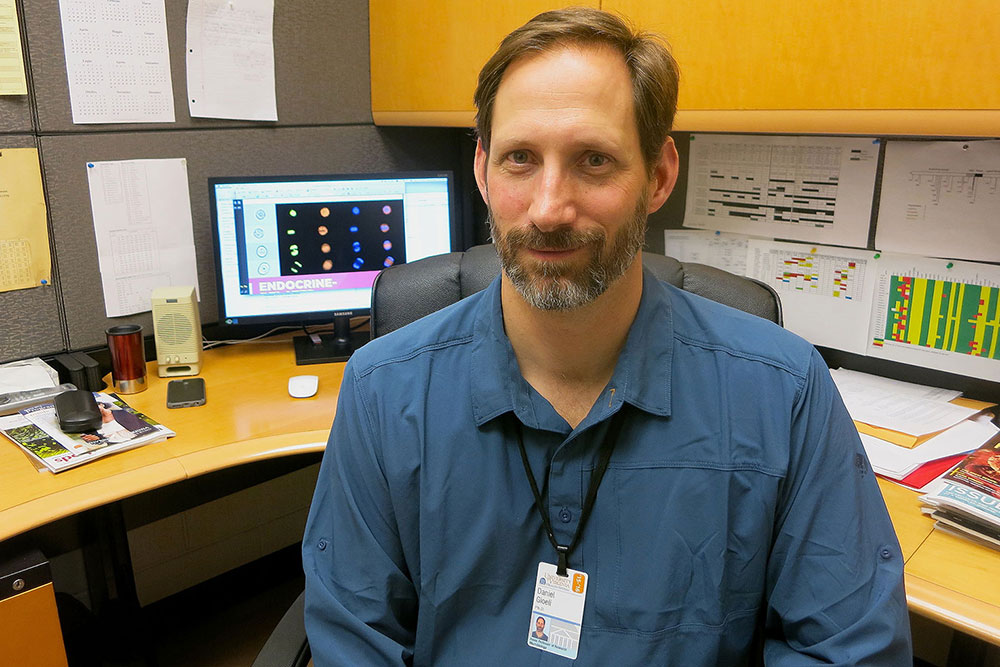A newly discovered connection between two common prostate cancer treatments may soon make prostate cancer cells easier to destroy. Drugs that could capitalize on the discovery are already in the pipeline, and a clinical trial to test whether the finding could improve treatments for prostate cancer patients could be only a few years away.
The discovery also may allow doctors to better determine which forms of treatment will most benefit individual patients, and there may be implications for other forms of cancer as well.
Prostate cancer is the second-leading cause of cancer death among American men. Common treatments include radiation and androgen ablation – treatment designed to suppress or block the production of male hormones – and researchers at the University of Virginia School of Medicine have found an unexpected link between the two.
The researchers determined that a cellular signaling pathway that is activated in response to radiation – to halt cell division and allow repair of damage to DNA – also controls cells’ sensitivity to androgen, a male hormone that prostate cancer cells need for growth. Androgen and androgen sensitivity, in turn, can affect how susceptible prostate cancer cells (and possibly other cancer cells) are to the radiation treatment used to kill them.
“Now we have a novel link between two different standards of care for advanced prostate cancer,” said UVA researcher Dan Gioeli of the Department of Microbiology, Immunology and Cancer Biology and the UVA Cancer Center. “For locally advanced prostate cancer, radiation therapy is one of the standards of care, and that induces DNA damage, which would activate this pathway. Another standard of care for metastatic prostate cancer is androgen ablation, and that acts to inhibit androgen receptor activity. Now we have a new molecular understanding of how those two different standards of care might be connected.”
With this new information, doctors may be able to manipulate the signaling pathway, called “Checkpoint Kinase 2,” to make it easier to kill prostate cancer cells. By blocking the signaling process, for example, they might sensitize cancer cells to the radiation intended to destroy them. (Gioeli and his colleagues believe that this signaling may be lost as prostate cancer advances, helping to explain why the disease inevitably becomes resistant to androgen deprivation therapy.)
Major pharmaceutical companies are already developing drugs to inhibit CHK kinases, and Gioeli hopes that this will speed the clinical trial testing that could lead to better prostate cancer treatments. Testing in people might begin in only three to five years, though it may take longer depending on how the work progresses, he said.
“The next steps are to see whether our predictions about … targeting this pathway could enhance cancer-killing in response to radiation or androgen ablation,” Gioeli said. “Perhaps it would lead to a three-way combination where we would be looking at how androgen withdrawal sensitizes tumor cells to radiation therapy and whether we can further enhance that sensitization by inhibiting this pathway.”
The findings have been published online in the journal Cancer Research. The article’s authors are Huy Q. Ta, Melissa L. Ivey, Henry F. Frierson Jr., Mark R. Conaway, Jaroslaw Dziegielewski, James M. Larner and Gioeli.
The work was supported by the National Institutes of Health’s National Cancer Institute (grants R01 CA178338 and R01 CA124706) and the Paul Mellon Urologic Cancer Institute.
Media Contact
Article Information
December 17, 2015
/content/uva-prostate-cancer-discovery-may-make-it-easier-kill-cancer-cells

